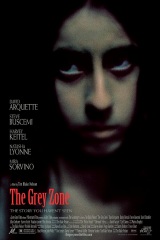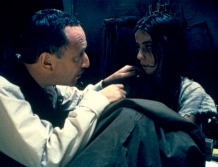|
The Grey Zone
|
| |
 |
USA, 2001. Rated R. 108 minutes.
Cast:
David Arquette, Allan Corduner, Steve Buscemi, Harvey Keitel, Mira Sorvino,
Natasha Lyonne, Daniel Benzali, David Chandler, Kamelia Grigorova
Writer: Tim Blake Nelson, based on his play, and in part on a memoir
by Dr. Miklos Nyiszli
Cinematographer: Russell Lee Fine
Producers: Pamela Koffler, Christine Vachon, Tim Blake Nelson,
Avi Lerner, Danny Lerner
Director: Tim Blake Nelson
LINKS
|
 kay,
who's up for another movie about the Holocaust to go with your popcorn and Milk
Duds? No? Does the idea of yet another one make you groan?
kay,
who's up for another movie about the Holocaust to go with your popcorn and Milk
Duds? No? Does the idea of yet another one make you groan?
It sounds insensitive, but another Holocaust movie seems really unnecessary.
Hollywood (and other film industries) have covered this tragic period every
which way, from the brilliant Schindler's
List to award-winning documentaries like Into the Arms of Strangers:
Stories of the Kindertransport, not to mention the highly regarded comedy-drama
hybrid Life Is Beautiful and failures like Jakob the Liar. And
that's only in the last ten years.
Forget those other films, in which good and evil are always clearly delineated.
Nazis: bad, Jews: good. It's not exactly difficult to figure out. The Grey
Zone, based on the play of the same name by writer/director Tim Blake Nelson,
is different. As its title implies, the film has found an ambiguous middle ground,
where right and wrong are not so easily distinguished.
Wait. An ambiguous middle ground in the Holocaust--what the hell is that? Has
there ever been a more monstrous evil than Hitler and his minions? Have there
ever been any more tragic victims than the six million Jews (and countless others)
gassed and burned in the Nazi death factories?
Well, no, but Nelson has found a grey zone nonetheless. In the colorless ashes
floating thickly around the furnaces at Auschwitz, there toiled Jews, herding
other Jews into the gas chambers and processing their corpses. Called the Sonderkommandos,
those Jews worked there by choice, not by force. The Nazis had presented them
with two unimaginable options: die immediately or facilitate the murder of fellow
Jews. In exchange, they would live an extra four months while enjoying special
privileges such as larger quarters, better food, books, alcohol, and cigarettes.
Most of us would like to think that the choice offered by the Nazis would be
easy. How is living for just an extra four months worth being a party to murder?
Nelson knows better. He knows that survival is the most basic human instinct,
and that there is little any of us wouldn't do to live an extra four months--even
four weeks or four days.  Our
capacity to rationalize almost anything is similarly vast. "We're not the ones
pulling the lever." "The Nazis will kill them with or without our help." "If
I don't do it, someone else will." Then there's the mater of Hope. Four months
means more chances to escape or be saved by the Allies. Considering such an
excruciating decision in theory is one thing. Facing it is another.
Our
capacity to rationalize almost anything is similarly vast. "We're not the ones
pulling the lever." "The Nazis will kill them with or without our help." "If
I don't do it, someone else will." Then there's the mater of Hope. Four months
means more chances to escape or be saved by the Allies. Considering such an
excruciating decision in theory is one thing. Facing it is another.
Though Nelson had a budget of only some five million to make The Grey Zone,
his atypical take on the Holocaust looks more lavish than that. He saved millions
by filming in Bulgaria, where he recreated two model crematoria at eighty-percent
scale, based on the same architectural plans used at Auschwitz. He not only
attracted a remarkable cast, but got them all to read a tall stack of books
that included the memoirs of Primo Levi. Harvey Keitel, who is Jewish, appears
as a German officer. Steve Buscemi, Daniel Benzali, David Arquette, and David
Chandler (who starred in the stage version) play Sonderkommandos. Mira Sorvino
(in a spectacularly unconvincing wig) and Natasha Lyonne portray prisoners who
work in a munitions factory. The standout in the cast, however, is relative-unknown
Allan Corduner (Topsy-Turvy) as Dr. Miklos Nyiszli, a Hungarian Jew who
assisted with Josef Mengele's infamous experiments and upon whose first-hand
accounts The Grey Zone is largely based. Stuck between both sides like
the Sonderkommandos, the anguished yet self-possessed Nyiszli is a mesmerizing
individual. The film could easily spend its entire running time studying only
him.
The grim story centers on the only armed uprising ever to occur at Auschwitz,
catalyzed by the Sonderkommandos' efforts to preserve the life of a little girl
who miraculously survives a gassing. (Like Dr. Nyiszli and Keitel's Erich Muhsfeldt,
and unlike the other characters, she is based on a historical figure.) Though
not complex, the story is difficult to follow because Nelson has decided to
include only a few expository captions at the beginning of the film. We are
then thrust into the midst of the Hungarian Sonderkommandos, who decline to
review background material for our benefit (imagine that!). It takes a half-hour
to sort out who everyone is. Meanwhile, the women's story, which involves their
efforts to smuggle explosives to the Sonderkommandos, is kept separate from
the rest of the film, just as female prisoners were segregated from the men.
Narratively, it doesn't mesh at all, and is not necessary to advance the plot.
Nelson seems to have included it to contrast the choices made by the women and
the Sonderkommandos.
Unlike other Holocaust films, The Grey Zone avoids sentimentality and
eschews obvious storytelling devices. Most filmmakers will insist they are storytellers,
not message deliverers. However, Nelson is fascinated by the philosophical dimensions
of his film. What does it mean to be a Sonderkommando? Are they victims or persecutors?
Can redemption ever be forthcoming? These questions are considered in an oppressive
atmosphere, where death is palpably omnipresent and much of the action takes
place amid piles of corpses. Though there are also long contemplative stretches
(the film is not scored), during which Nelson contrasts the quiet beauty of
the surroundings (intentionally cultivated by the Nazis) with the evil perpetrated
there, The Grey Zone is dialogue focused. Nelson insists that he won't
bring a work to the screen until he is sure it can be a movie and not a play,
yet with its stagy conversational rhythms, The Grey Zone fails to shed
its theatrical origins. Characters who argue do so stiffly, patiently allowing
each other to finish before rebutting.
Another reviewer has astutely observed that The Grey Zone is a work
of "rigid artistic principles." These aspects lend the film a stiffness that
clashes with Nelson's stated desire to make the ethical dilemmas of the Holocaust
relevant to today's audiences. One decision, however, is a welcome one. The
actors speak in plain American English, because their characters would, after
all, not be speaking in their native tongues with foreign accents. Nelson uses
accents only to denote when Germans are speaking, to contrast with the Hungarian
spoken by the Sonderkommandos. This means that Keitel's acting is burdened by
thick, barely credible inflections, but the contemporary tones of the other
performances do help bridge the gap between film and audience. This won't help
The Grey Zone go any better with popcorn and Milk Duds, but it's worth
seeking out.
Review
© October 2002 by AboutFilm.Com and the author.
Images © 2002 Lions Gate Films. All Rights Reserved.

 Our
capacity to rationalize almost anything is similarly vast. "We're not the ones
pulling the lever." "The Nazis will kill them with or without our help." "If
I don't do it, someone else will." Then there's the mater of Hope. Four months
means more chances to escape or be saved by the Allies. Considering such an
excruciating decision in theory is one thing. Facing it is another.
Our
capacity to rationalize almost anything is similarly vast. "We're not the ones
pulling the lever." "The Nazis will kill them with or without our help." "If
I don't do it, someone else will." Then there's the mater of Hope. Four months
means more chances to escape or be saved by the Allies. Considering such an
excruciating decision in theory is one thing. Facing it is another.
